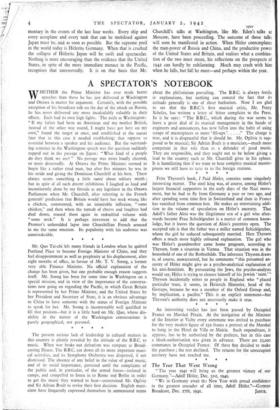The present serious lack of leadership in cultural matters in
this country is plainly revealed by the attitude of the B.B.C. to music. When war broke out defeatism was rampant at Broad- casting House. The B.B.C. cut down all its more important musi- cal activities, and its Symphony Orchestra was dispersed, if not dismissed. The absence of any belief in the value of good music, and of its social importance, persisted until the complaints of the public and, in particular, of the armed forces—isolated in camps, and compelled to listen in to Rome and Berlin in order to get the music they wanted to hear—constrained Mr. Ogilvie and Sir Adrian Boult to revise their first decision. English musi- cians have frequently expressed themselves in unmeasured terms about the philistinism prevailing. The B.B.C. is always fertile ir explanations, but nothing can conceal the fact that its attitude generally is one of sheer barbarism. Now I am glad to see that the B.B.C.'s first musical critic, Mr. Percy Scholes, has written a letter of bitter complaint to the Press. In it he says: " The B.B.C., which during the war seems to leave a great deal of its musical management in the hands of engineers and announcers, has now fallen into the habit of using scraps of masterpieces as mere fill-ups' " The charge is true, and it is disgraceful that it should be. Mr. Ogilvie is sup- posed to be musical; Sir Adrian Boult is a musician,—much more competent in that role than as a defender of good music. They are responsible, and they ought not to be below giving a lead to the country such as Mr. Churchill gives in his sphere. It is humiliating that if we want to hear complete musical master- pieces we still have to tune in to the foreign stations. * * * *


























 Previous page
Previous page